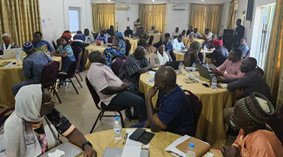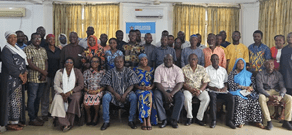By Samuel SAM
Civil Society Organisations (CSOs) have called for the inclusion of all stakeholders in development and implementation of the 2026–2029 Medium-Term Development Plan (MTDP), stating that broad participation is essential in addressing the diverse needs of Ghanaians and advancing the Sustainable Development Goals (SDGs).
They stressed the need for citizen engagement from community level through to the assemblies, with Metropolitan, Municipal and District Chief Executives and Planning Officers playing leading roles.
This, they believe, will ensure that the real development needs and service delivery gaps – ranging from economic development and social services to peace and security and Water, Sanitation and Hygiene (WASH) – are properly identified and addressed.
According to the CSOs, decentralising the planning process would enable the assemblies to gather and incorporate input from key stakeholders, thereby facilitating effective development planning and implementation to support national growth.
This call was made during a convening workshop organised by STAR-Ghana Foundation under the theme ‘Enhancing Participatory Governance: Influencing the MTDP for Inclusive and Sustainable Development’.
The event forms part of the foundation’s Actions for Voice, Influence and Inclusive Development (AVID) project, which aims to promote inclusive and participatory governance.
The interventions of STAR-Ghana Foundation and its partners focus on influencing and engaging duty-bearers at local, regional and national levels to secure their responsiveness to the concerns of underserved groups.
With processes for formulating the 2026–2029 MTDPs and corresponding Annual Action Plans by Metropolitan, Municipal and District Assemblies (MMDAs) underway, STAR-Ghana and its partners are leveraging the opportunity to highlight needs of their target groups.
The objective is to ensure that the MTDP reflects their most pressing concerns and provides a framework for monitoring implementation.
The convening will also take place in three additional zones – Kumasi, Bolgatanga and Ho – from 8th to 17th April. Thirty MMDAs are expected to be engaged across the four zones to help shape the MTDP agenda to better address the pressing needs of underserved populations.
The event also served to present emerging issues and recommendations from project implementation as preliminary inputs into the MTDP, while reinforcing collaboration between MMDAs, STAR-Ghana Foundation and its partners.
Mr. Charles Akurugu, Acting Municipal Director for the Savelugu Assembly, commended the initiative, noting that it will help in addressing the specific needs of citizens – which ought to be reflected in the MTDP.
“This MTDP needs the involvement of everyone, including CSOs like STAR-Ghana, to deliberate on issues that will give the plan proper perspective,” he said.
He added that while assemblies are prepared for consultation, development and implementation of the MTDP, resource allocation remains a key challenge. Mr. Akurugu therefore called for decentralisation of both processes and funding to ensure a successful and inclusive planning exercise.

Raymond Danso, Portfolio Manager at STAR-Ghana Foundation, explained that the organisation’s role is facilitating the process to ensure that duty-bearers engage directly with citizen groups.
This enables clear identification and articulation of the issues, which can then be incorporated into the development plan.
“Once these issues are included in the plan, the likelihood of them receiving resources for implementation increases and their prioritisation can be better-managed,” he said.
He added that the AVID project’s core mandate is to work with underserved populations – particularly rural women, smallholder farmers, persons with disabilities and informal sector workers – to build their capacity and empower them to influence decision-making and policy, especially at the municipal and district levels.
“It is crucial that citizens have access to quality public goods and services – and one of the ways to ensure this is through collaborative agenda-setting with duty-bearers,” Mr. Danso emphasised.










